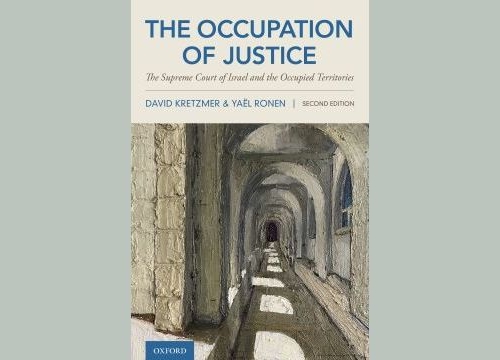Book Launch – The Occupation of Justice: The Supreme Court of Israel and the Occupied Territories
Event


OUP
Judicial review by Israel's Supreme Court over actions of Israeli authorities in the territories occupied by Israel in 1967 is an important element in Israel's legal and political control of these territories.
The Occupation of Justice by David Kretzmer and Yaël Ronen (Second Edition, Oxford Univerity Press, 2021) presents a comprehensive discussion of the Court's decisions in exercising this review. It includes updated material and analysis, as well as new chapters. Inter alia, it addresses the Court's approach to its jurisdiction to consider petitions from residents of the Occupied Territories; justiciability of sensitive political issues; application and interpretation of the international law of belligerent occupation in general, and the Fourth Geneva Convention in particular; the relevance of international human rights law and Israeli constitutional law; the rights of Gaza residents after the withdrawal of Israeli forces and settlements from the area; Israeli settlements and settlers; construction of the separation barrier in the West Bank; security measures, including internment, interrogation practices, and punitive house demolitions; and judicial review of hostilities.
This online book launch with the two authors will discuss Israel's Supreme Court's decisions on exercising review over actions of Israeli authorities in the territories occupied by Israel.
Moderator
- Émilie Max, Researcher, Geneva Academy
Panelists
- David Kretzmer, Bruce W. Wayne Emeritus Professor of International Law, Hebrew University of Jerusalem
- Yäel Ronen, Professor of International Law, Academic Center for Science and Law; Research Fellow, Minerva Center for Human Rights, Hebrew University, and Academic Editor, Israel Law Review
- Liron Libman, (retired) Colonel and Former Head of the International Law of the Israeli Defense Forces
- Shlomy Zachary, Lawyer
- Yukata Arai, Professor of Law, University of Kent & Brussels School of International Studies
Video
Book Launch – The Occupation of Justice The Supreme Court of Israel and the Occupied Territories
In this online event, which also marked the book launch of - The Occupation of Justice: The Supreme Court of Israel and the Occupied Territories - the two authors (David Kretzmer and Yäel Ronen) discussed Israel's Supreme Court's decisions on exercising review over actions of Israeli authorities in the territories occupied by Israel.









